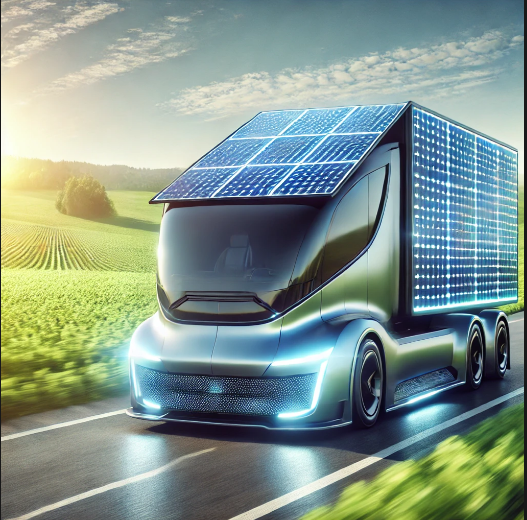The world of innovation is constantly evolving, and one area that is capturing significant attention is the development of solar-powered vehicles. Among them, the concept of solar trucks stands out as a symbol of forward-thinking, sustainability, and energy efficiency. As global demand for renewable energy solutions rises, solar trucks represent a monumental shift toward a greener future. These vehicles, designed to harness the sun’s power, offer numerous benefits that not only support environmental sustainability but also introduce new opportunities for the transportation and logistics industries.
The Rise of Solar Trucks: Why Now?
The conversation surrounding solar-powered vehicles has intensified over the past few years as countries and corporations strive to reduce their carbon footprints. The transportation sector, in particular, is one of the leading contributors to greenhouse gas emissions. According to the International Energy Agency (IEA), road transportation alone accounts for almost 18% of global carbon dioxide emissions.
The push for electric vehicles (EVs) is already in full swing, with several companies transitioning their fleets to battery-powered systems. However, electric trucks, which rely on conventional charging stations, still face limitations regarding charging infrastructure and battery life. Solar trucks present an innovative alternative, as they can generate and store their power directly from the sun. This solves several challenges and aligns with the broader push for renewable energy solutions.
The advancements in solar technology and battery storage are making solar trucks a viable solution for the near future. Solar panels, once bulky and inefficient, have become lightweight and more efficient, allowing for greater energy capture. Coupled with advancements in battery technology, solar trucks are positioned to revolutionize the transportation industry.
How Solar Trucks Work
The basic premise of solar trucks revolves around integrating photovoltaic (PV) solar panels into the vehicle’s design. These panels capture sunlight and convert it into electricity, which is stored in high-capacity batteries. This stored energy is used to power the electric motor that drives the truck.
Unlike electric trucks that rely entirely on charging stations, solar trucks can generate power while on the move or when stationary, provided there is access to sunlight. This makes them ideal for long-haul transport or in regions with plenty of natural Additionally, solar trucks may incorporate regenerative braking systems, which convert the truck’s kinetic energy back into electrical power during deceleration.
While solar panels alone may not provide 100% of the energy needed for a fully loaded truck on long journeys, they can significantly extend the range of the pickup before it needs to stop for recharging. This can reduce downtime and energy consumption, providing a more efficient and sustainable transportation model.
Key Advantages of Solar Trucks
1. Reduction in Carbon Emissions: One of the primary reasons for developing solar trucks is their potential to significantly reduce the amount of carbon dioxide produced by the transportation industry. By utilizing solar energy instead of fossil fuels, these trucks emit zero emissions, helping companies meet sustainability goals and comply with environmental regulations.
2. Cost Efficiency: While the initial investment in solar trucks may be higher due to the cost of solar panels and advanced batteries, the long-term savings are substantial. Solar energy is free, meaning businesses can reduce their dependence on costly fuel or charging infrastructure. Furthermore, solar trucks require less maintenance than traditional internal combustion engine (ICE) vehicles, resulting in lower operational costs.
3. Energy Independence: Solar trucks offer the advantage of energy independence. By generating power on the go, companies can avoid reliance on grid-based charging stations, which may not always be available, particularly in remote areas. This makes solar trucks a perfect solution for long-haul transport, cross-border logistics, and rural operations.
4. Extended Range and Flexibility: Solar panels provide an additional source of power that can extend the range of electric trucks. This is especially valuable for trucks that operate in sunny climates or regions with long daylight hours. The added flexibility means that these trucks can operate more effectively in areas where conventional electric vehicle infrastructure is sparse.
5. Reduced Operational Downtime: One of the biggest challenges for the logistics industry is downtime related to vehicle refueling or recharging. Solar trucks can minimize downtime by generating power throughout the day, potentially reducing the need for lengthy recharging stops and ensuring more continuous operation.
6. Positive Brand Image and Customer Appeal: With an increasing focus on environmental responsibility, companies that adopt solar trucks can enhance their corporate image as leaders in sustainability. This can appeal to environmentally-conscious customers and partners, creating a competitive edge in industries where green practices are becoming a key differentiator.
Current Players in the Solar Truck Market
Several companies and startups are exploring the potential of solar trucks, each bringing unique approaches to the challenge. For instance, companies like Tesla have hinted at integrating solar panels into their future models, while startups like Sono Motors are working on vehicles that fully embrace solar technology.
Another notable example is Lightyear, a Dutch company that has developed solar-powered cars and plans to scale their technology for larger vehicles such as trucks. Their approach involves integrating solar panels directly into the surface of the vehicle, maximizing the amount of energy captured from sunlight.
The potential for solar trucks extends beyond logistics companies. Delivery services, municipalities, and public transport organizations will likely also benefit from this innovation. Amazon, for example, has already announced plans to transition to more sustainable vehicles, and solar-powered delivery trucks could play a crucial role in this transition.
Challenges Ahead for Solar Trucks
While solar trucks hold immense promise, they are not without challenges. One of the primary issues is the current efficiency of solar panels. Even the most advanced solar panels capture only about 20-25% of the sunlight that hits them. This means that on cloudy days or during the night, the trucks will still need to rely on stored energy or alternative charging solutions.
Moreover, the large surface area required for solar panels to generate enough energy presents a design challenge. Trucks have limited space for panels, and while creative design solutions can help, they may still not generate enough power to run a fully loaded truck for long distances.
Battery storage is another critical factor. High-capacity batteries are essential for storing the energy generated by sunlight from solar panels, but they remain expensive and heavy. This adds to the overall cost and weight of the vehicle, potentially reducing its cargo capacity and efficiency.
Lastly, the solar truck industry will need support from governments and infrastructure providers. Policies that incentivize the adoption of renewable energy solutions, along with investments in charging infrastructure and battery technology, will be essential to making solar trucks a mainstream reality.
Conclusion: A Solar-Powered Future
The future of solar trucks is bright, with the potential to reshape the transportation industry and contribute significantly to global sustainability efforts. As technology continues to advance, the challenges currently facing solar trucks are likely to diminish, paving the way for widespread adoption.
For businesses looking to reduce their carbon footprint, solar trucks offer an innovative and cost-effective solution. As companies and governments alike strive to meet ambitious climate goals, solar trucks represent a practical and exciting path toward a cleaner, greener future.
This exciting innovation not only supports the shift toward renewable energy but also promises to bring cost savings, operational efficiency, and environmental benefits to industries across the globe. The road to a solar-powered future is underway, and solar trucks are poised to lead the charge.





